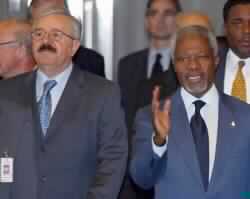HIGHLIGHTS: Iraq Wants Another Session of Discussions-No Date Was Set||Iraq Insists U.S.-Led UN Security Council Answers Questions it Tabled on Timetable for Lifting Sanctions & Threats to Topple Saddam Hussein||Iraq to Return Kuwait's National Archives Looted During 1991 Gulf War|| STORY: The UN failed to reach an accord with Iraq on Friday to resume weapons inspections after intensive talks involving Secretary-General Kofi Annan and Iraqi Foreign Minister Naji Sabri. (Read photo caption)
The impasse will favor those in the Bush administration who want the military to topple President Saddam Hussein while many European and Arab leaders want to find a diplomatic compromise.
The two-day meeting was the third high-level session on the arms inspectors this year.
"They didn't say yes," Annan, told reporters after the talks, which he called constructive, ended on Friday. "I would have preferred more," he said, adding: "I cannot force a decision."
Sabri said he expected another round of talks in the coming months on the weapons inspectors, absent from Iraq for more than three years, but Annan said no date had been set for the discussions, expected to be in Vienna or Geneva.
The Iraqi delegation will now go back to report to their authorities, he said. "We have agreed to maintain contacts, including continuing discussions on technical matters."
IRAQ WANTS ANSWERS
Sabri made clear he wanted answers to many of the questions he submitted at the last talks in May, on issues ranging from U.S. threats for a "regime change" in Baghdad to a timetable for the lifting of U.N. sanctions, imposed when Iraq invaded Kuwait in August 1990.
But Annan has said repeatedly he is not in a position to answer any political questions concerning U.S. policy or other issues that fall within the province or the 15 U.N. Security Council members.
However, Sabri was not persuaded and accused the Security Council of violating its own resolutions.
"We need assurances from the United Nations," Sabri said. "We are the victims of illegal practices forced by the United States on the Security Council. We have lost 1.67 million citizens as a result of the sanctions the Security Council imposed in clear violation of international law."
Richard Grenell, a spokesman for John Negroponte, the U.S. ambassador to the United Nations, told Reuters in New York: "We are disappointed yet again but not surprised that they haven't complied with Security Council resolutions."
The weapons inspectors, whose return is a key requirement to lifting U.N. sanctions, left Iraq in December 1998 on the eve of a U.S.-British bombing raid and have not been allowed to return. Iraq maintains the inspectors were U.S. spies and that it has declared all its dangerous arms programs.
The United States has stepped up war plans for what President Bush calls a "regime change," in part to pressure Iraq into allowing U.N. inspectors to check on weapons of mass destruction.
Washington would lose much support for its campaign against Saddam if the U.N. inspectors were allowed to return, diplomats and analysts say.
PENTAGON REPORTEDLY DRAFATS PLANS TO INVADE IRAQ
The New York Times reported on Friday that the Pentagon had drafted plans to invade Iraq, using air, land and sea-based forces. The newspaper said the plans appeared in an advanced state although an attack did not seem imminent.
The most positive news to come out of the talks were arrangements made between Iraq and the United Nations to return tons of archives of state papers looted from Kuwait when Baghdad's troops occupied the emirate in August 1990.
PHOTO CAPTION
U.N. Secretary General Kofi Annan (R) gestures next to Iraqi Foreign Minister Naji Sabri (L) prior to a news conference in Vienna July 5, 2002. The United Nations and Iraq failed to reach an accord on the return of arms inspectors to Baghdad after the third round of high-level talks. (Leonhard Foeger/Reuters)
- Author:
& News Agencies - Section:
WORLD HEADLINES


 Home
Home Discover Islam
Discover Islam Quran Recitations
Quran Recitations Lectures
Lectures
 Fatwa
Fatwa Articles
Articles Fiqh
Fiqh E-Books
E-Books Boys & Girls
Boys & Girls  Articles
Articles










